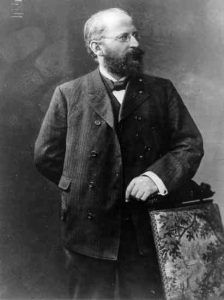5.2.4 Social Democracy
Dr. Étienne Schmitt
Much like “communism” until 1919, social democracy was not clearly distinguishable from socialism. As a polysemous expression, it referred to both socialist parties and “reformist” currents that proposed to gradually transform society through democratic institutions. Social democracy evolved in several contexts, most notably in the debate between orthodox Marxism and revisionist Marxism that took place in Germany at the beginning of the 20th century, which laid the groundwork for all social democratic currents.
The opposition between Lassallism and Marxism
German social democracy emerged with the creation in 1863 of Ferdinand Lassalle’s General German Workers’ Association (Allgemeiner Deutscher Arbeiterverein, ADAV). Although he was close to the League of Communists, Ferdinand Lassalle never shared the ideas of Friedrich Engels and Karl Marx. He believed that a democratic and socialist state is the ideal framework for the emancipation of the working class since such a state could organize production cooperatives to put an end to capitalism. Ferdinand Lassalle conceives universal suffrage – which was extremely rare in his time – as the instrument of this state revolution. Although Ferdinand Lassalle died prematurely in 1864, his influence on the development of German social democracy was immense.
The break between Lasallians and Marxists has not fully taken place yet. Because of the repression of the socialist movement, Lasallians and Marxists even ended up agreeing on a common platform at the Gotha congress in 1875. Strongly criticized by Karl Marx, who saw in it the stranglehold of Lassallism over the workers’ movement ([1875] 1970), the Gotha Program is one of the founding acts of German social democracy. From this program, the Social Democratic Party of Germany (Sozialdemokratische Partei Deutschlands, SPD) was born. Although it became illegal as a consequence of the anti-socialist laws proclaimed in 1878, the SPD continued to operate underground until 1890, when the ban on it was lifted.
Eduard Bernstein’s Revisionism
To avoid a new Gotha, Friedrich Engels entrusted one of his followers, Eduard Bernstein, with the task of writing the new SPD program. He partnered him with another emerging figure of Marxism: Karl Kautsky. While Karl Kautsky wrote the theoretical part of the program, Eduard Bernstein developed the practical part. Adopted the following year at the Congress of Erfurt, this program has an undeniable Marxist hue, though a gap between theory and practice is felt. In this respect, the Erfurt Program heralds the opposition between Kautsky’s orthodox posture and Bernstein’s revisionism. With the death of Friedrich Engels in 1895, Bernstein gradually developed reformist ideas. He published a series of articles between 1896 and 1898 entitled Problems of Socialism around a central question: Is revolution desirable? Following the lively debates his articles provoked within the SPD, he published a book: Evolutionary Socialism (1899), which marked a breaking point with orthodox Marxism.

While subscribing to scientific socialism, Eduard Bernstein believes that Karl Marx’s predictions have not been fulfilled: the proletariat has not become poorer and, on the contrary, a middle class has emerged. As times had changed, he insists that the analysis cannot be dogmatic and that it is necessary to take into consideration not only the evolution of the workers’ movement but also that of capitalism. In putting forward this rationality in the analysis, he wants to be reasonable in the face of the idea of a violent revolution and the dictatorship of the proletariat that would succeed it. Moreover, he believes that socialism not only fights for the emancipation of the proletariat but for society as a whole. Social democracy must integrate all the dominated classes, including the middle classes. Rather than revolution, Eduard Bernstein favours evolution. Thus, he conceives democracy as the principle of “the suppression of class government” (Bernstein, [1898] 1907). Nevertheless, this aim requires real democracy. To achieve it, Eduard Bernstein takes up the Lasallian thesis of universal suffrage expecting that it neutralizes the bourgeois character of the state to become an instrument of the general interest.
Social democracy elsewhere
Eduard Bernstein’s revisionism strains Marxist theory of its revolutionary elements while rehabilitating the Lasallian theses in order to put them back within scientific socialism. If Bernstein’s social democracy encompasses the context of Germany at the end of the 19th and the beginning of the 20th century, the reformist currents in other countries are also drawn on local political ideologies to revise Marxist theses. In France, republican socialism is inspired by republicanism, utopian socialism and mutualism. In the United Kingdom, the labour movement is instilled by the Fabian Society articulating the heritage of Owenism and that of trade-unionism. In Italy, social democracy is the work of Filippo Turati, who developed a non-dogmatic reading of Karl Marx rooted in a progressive republicanism inspired by one of the fathers of Italian unification: Giuseppe Mazzini. In the United States of America, social democracy was built on the trade union and anti-segregationist movements. This broad diversity of local contributions makes it difficult to designate social democracy as a homogeneous current.

